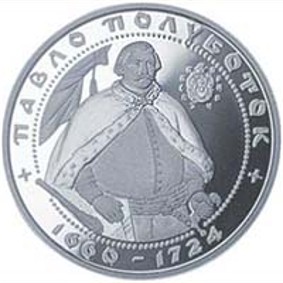Polubotok, Pavlo
Polubotok, Pavlo, b ca 1660, d 29 December 1724 in Saint Petersburg. (Portrait: Pavlo Polubotok.) Cossack statesman; son of Leontii Polubotok. A graduate of the Kyivan Mohyla College (1679), he became a notable military fellow in 1689. Because of his involvement in Cossack starshyna conspiracies against Hetman Ivan Mazepa, he was barred from government positions until 1706, when he was appointed colonel of Chernihiv regiment. After Mazepa's defeat at the Battle of Poltava in 1709 and flight abroad, Polubotok submitted his candidacy for the position of hetman, but Emperor Peter I did not trust him and supported Ivan Skoropadsky's candidacy instead. In compensation Polubotok was given many properties (including the town of Liubech and over 2,000 peasant households) in the Hetman state and Slobidska Ukraine, which gift made him the wealthiest member of the Cossack starshyna. After Skoropadsky's death in 1722, Polubotok became acting hetman. Peter, however, forbade the election of a new hetman and created the Little Russian Collegium to rule in the Hetman state in place of the General Military Chancellery. Polubotok's repeated appeals to Peter to abolish the collegium, fully restore the starshyna's privileges, and allow the election of a new hetman, coupled with Danylo Apostol's submission of the Kolomak Petitions, angered the emperor and resulted in the arrest of Polubotok and his closest associates in November 1723. Polubotok was imprisoned in Saint Petersburg's Peter and Paul Fortress, where he died a year later, and his properties were confiscated and redistributed.
Polubotok had an abiding interest in Ukrainian history and wrote a chronicle describing the events of 1452–1715, which was included in the diary of his son-in-law, Yakiv A. Markovych. His defense of Ukrainian (albeit Cossack starshyna) rights and his tragic fate made him a hero in the eyes of his contemporaries and subsequent generations of Ukrainians. He was lionized in Istoriia Rusov and by such early 19th-century Ukrainian historians as Dmytro Bantysh-Kamensky and Mykola Markevych. In 1917 the Ukrainian Central Rada named the Polubotok Regiment in his honor. Populist (Oleksander Lazarevsky, Aleksandra Yefymenko) and Soviet historians, however, have presented him in a harsh light by concentrating on his personal ambitions and overt class interests. Vadym Modzalevsky and Mykola Vasylenko have offered a more objective assessment. Non-Soviet 20th-century Ukrainian historians, though admitting that he was primarily a spokesman for the Cossack elite and its privileges, have viewed Polubotok as a defender of the principles of Ukrainian autonomy articulated in the Pereiaslav Treaty of 1654.
Polubotok has been depicted in Taras Shevchenko's poems ‘Son’ (Dream) and ‘Velykyi l’okh’ (Great Vault) and in Kost Burevii's historical drama Pavlo Polubotok. His great wealth and traditional popularity gave rise in the 1860s to the legend that he had deposited a massive amount of gold in Lloyd's Bank in London. The legend caused a stir before the outbreak of the First World War and still reappears occasionally in the press.
BIBLIOGRAPHY
Miloradovich, G. ‘Opis' imushchestv Polubotka,’ Chteniia v Moskovskom obshchestve istorii i drevnostei, 1862, no. 3
Lazarevskii, A. ‘Pavel Polubotok: Ocherk iz istorii Malorossii XVIII veka,’ ra, 1880, no. 1
Modzalevskii, V. Pavel Polubotok (Saint Petersburg 1905)
Oleksander Ohloblyn
[This article originally appeared in the Encyclopedia of Ukraine, vol. 4 (1993).]
.jpg)

.jpg)
